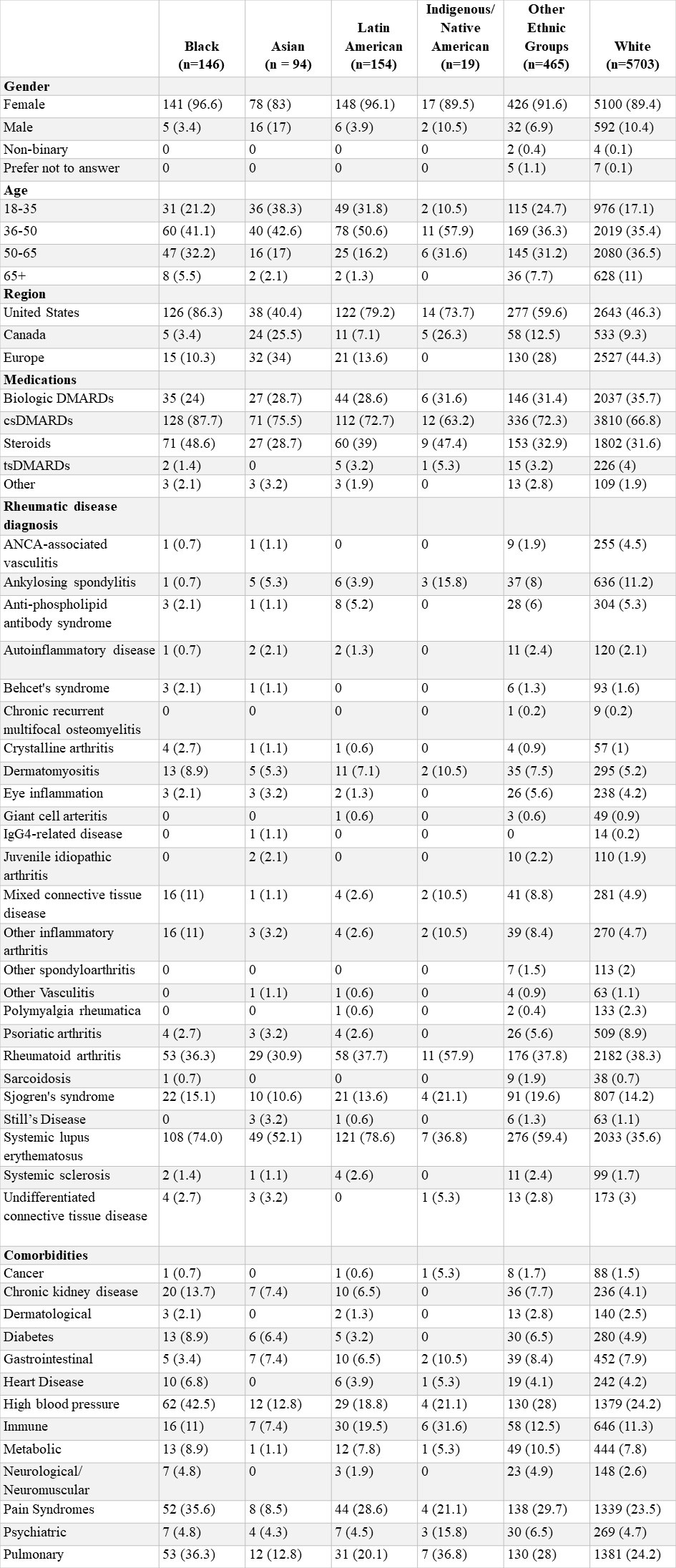Session Information
Session Type: Abstract Session
Session Time: 4:00PM-4:50PM
Background/Purpose: The COVID-19 pandemic has exacerbated structural and systematic barriers in access to healthcare for racial and ethnic minorities. The impact of these increased barriers on patients with rheumatic disease has not been studied. We describe the clinical characteristics and COVID-19 disease burden among racial and ethnic minority participants in an international survey of patients with rheumatic disease.
Methods: The COVID-19 Global Rheumatology Alliance (C19-GRA) Patient Experience Survey is an international, self-reported survey for adults and parents of children with rheumatic disease, with or without COVID-19 infection. The survey was distributed online by patient support organizations and social media platforms. Responses of participants living in Canada, the United States, and Europe were analyzed to compare outcomes between minority and non-minority groups. Descriptive statistics were used to describe patient characteristics and COVID-19 related outcomes.
Results: We report data on 6,581 respondents to the Patient Experience Survey. There were 5,703 (86.7%) respondents who identified as White, and 878 (13.3%) belonged to all other racial or ethnic groups (Table 1). Respondents from ethnic minority groups were mostly female (92.3%) with a mean age of 44.0 (SD 12.4). The most common rheumatic diseases include systemic lupus erythematosus (47.8%) and rheumatoid arthritis (37.2%).
A total of 455 (6.9%) participants reported a diagnosis of COVID-19; of these, 66 (14.5%) self-identified as a racial or ethnic minority including 12 (2.6%) who were Black. Among ethnic minorities, 24 patients diagnosed themselves based on symptoms and 42 were diagnosed by a physician according to symptoms or a lab result. Of patients who were hospitalized with COVID-19, 33 (73.3%) were White and 12 (26.7%) belonged to other ethnic groups.
Conclusion: This international survey reports data related to the impact of COVID-19 on racial and ethnic minorities with rheumatic disease. There were differences in high risk comorbidities, yet no difference in incidence of COVID-19 and severity of disease among various racial and ethnic groups compared to White participants. Racial and ethnic minorities were underrepresented in our survey, likely a consequence of systemic barriers that prohibit their engagement within the healthcare community.This reinforces the importance of collecting race-related data, particularly where there are concerns of inequities influencing health outcomes, and the need to implement targeted recruitment strategies to enhance representation of minority groups in research.
 Table 1. Demographic and clinical characteristics of racial and ethnic minorities from Canada, United States and Europe in the C19-GRA Patient Experience Survey (n=6581). Participants may have more than one condition and take more than one type of medication. csDMARD medications included: antimalarials (hydroxychloroquine, chloroquine), azathioprine, cyclophosphamide, cyclosporine, leflunomide, methotrexate, mycophenolate mofetil/mycophenolic acid, sulfasalazine, tacrolimus. bDMARD included: abatacept, belimumab, CD-20 inhibitors, IL-1 inhibitors, IL-6 inhibitors, IL-12/IL-23 inhibitors, IL-17 inhibitors, and anti-TNF. tsDMARD included: Janus Kinase inhibitors. Other included: IVIG, apremilast, thalidomide bDMARD, biologic DMARD; csDMARD, conventional synthetic DMARD; tsDMARD targeted synthetic DMARD, DMARD, disease-modifying antirheumatic drug.
Table 1. Demographic and clinical characteristics of racial and ethnic minorities from Canada, United States and Europe in the C19-GRA Patient Experience Survey (n=6581). Participants may have more than one condition and take more than one type of medication. csDMARD medications included: antimalarials (hydroxychloroquine, chloroquine), azathioprine, cyclophosphamide, cyclosporine, leflunomide, methotrexate, mycophenolate mofetil/mycophenolic acid, sulfasalazine, tacrolimus. bDMARD included: abatacept, belimumab, CD-20 inhibitors, IL-1 inhibitors, IL-6 inhibitors, IL-12/IL-23 inhibitors, IL-17 inhibitors, and anti-TNF. tsDMARD included: Janus Kinase inhibitors. Other included: IVIG, apremilast, thalidomide bDMARD, biologic DMARD; csDMARD, conventional synthetic DMARD; tsDMARD targeted synthetic DMARD, DMARD, disease-modifying antirheumatic drug.
To cite this abstract in AMA style:
Sirotich E, Semalulu T, Kennedy K, Surangiwala S, Larche M, Liew J, Levine M, Reed G, Ikram N, Harrison C, Howard R, Sinha R, Gore-Massy M, Hausmann J. Impact of the COVID-19 Pandemic on Racial and Ethnic Minority Groups Diagnosed with Rheumatic Diseases [abstract]. Arthritis Rheumatol. 2020; 72 (suppl 10). https://acrabstracts.org/abstract/impact-of-the-covid-19-pandemic-on-racial-and-ethnic-minority-groups-diagnosed-with-rheumatic-diseases/. Accessed .« Back to ACR Convergence 2020
ACR Meeting Abstracts - https://acrabstracts.org/abstract/impact-of-the-covid-19-pandemic-on-racial-and-ethnic-minority-groups-diagnosed-with-rheumatic-diseases/
